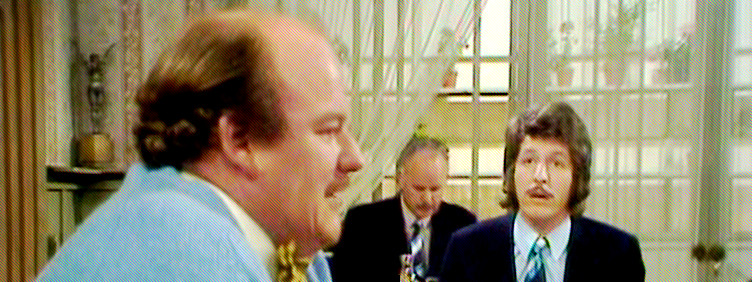
Last time in our analysis of No Ill Feeling!, we took an in-depth look at Dr. Upton’s nemesis, Mr. Davidson. We are now heading towards our final showdown with that particular fragment of humanity.
It is utterly glorious. It is also utterly savage, in a way that you might not expect from a 1971 LWT sitcom. And it’s something which seems to have been pretty much ignored by everyone in their analysis of the episode – in as much as the episode has had any analysis, beyond “look, there’s an early version of Basil”.
And when the episode has occasionally been granted some critical commentary, it has generally been negative. We saw an example of that last time; let’s take a look at another. Here’s Joel Morris, speaking on his excellent podcast Rule of Three:
“There’s a Doctor at Large where he tried the plot out first… Timothy Bateson plays a rotten hotelier, the guy the Pythons had met. And they do it – it’s written by John Cleese, 1971, and the thing that’s odd about it is that it’s written by the same guy, with a lot of the same jokes, and there’s even a Roy Kinnear character who’s a little like Bernard Cribbins’ character in this. It’s a dry run for everything. And it just dies.1
Rule of Three, Fawlty Towers: The Hotel Inspectors (29:07 – 29:28)
I really want to argue against the idea that No Ill Feeling! “just dies”. Because in some ways, the climax to this episode goes further than Fawlty Towers ever dared to go. I think it’s magnificent, and strange, and subversive, and angry, and everything John Cleese stood for.
It starts, innocently enough, in a pub. Upton is bitterly complaining about Mr. Davidson to his two old friends, Paul Collier (George Layton) and Dick Stuart-Clark (Geoffrey Davies), who he’s known since his days studying at St Swithin’s. “It’s bad enough at the hotel. Everyone there treats me like the medical profession’s answer to Brian Rix.”2 Luckily, the “St Swithin’s cavalry” are there to help Upton out, as they have done endless times before.
Carefully, the plan is hatched. But we don’t get to hear much about it. We simply cut to that evening in the dining room at the Bella Vista… and six minutes which will change Mr. Davidson’s life.
* * *
I hope the above has made it obvious that I’d really really like you to watch this six minute video in full. Get a cup of tea, settle down, and enjoy the show.
Let me put my cards on the table. This sequence – all in real time – is one of my favourite things in sitcom history. It’s a spectacular takedown of an odious character who fully deserves it, from four actors who make the most out of every line. When George Layton pipes up with “He died, you know”, it is absolutely sublime comedy, of a sort that I’m not sure you necessarily expect from a programme like Doctor at Large. The show has always been lots of fun, but this is something else. We are witnessing a man’s precariously built life dissolving.
It’s also John Cleese at his most vicious. From the opening devastating lie that Upton’s fiancé has been involved in a fatal accident – “With a fire engine!” – the episode takes on a brand new, razor-sharp edge. It certainly wouldn’t be true to state that the Doctor sitcoms have been bland until this point; after all, the episode Nice Bodywork – Lovely Finish manages to do uncomfortable dead body comedy a full nine years before Fawlty Towers.3 Still, the show has never gone into quite these waters before, with the full wrath of John Cleese on terrifying display. In 25 minutes, we go from business as normal… to the humiliation and destruction of a man that even Mr. Clifford can feel superior to.
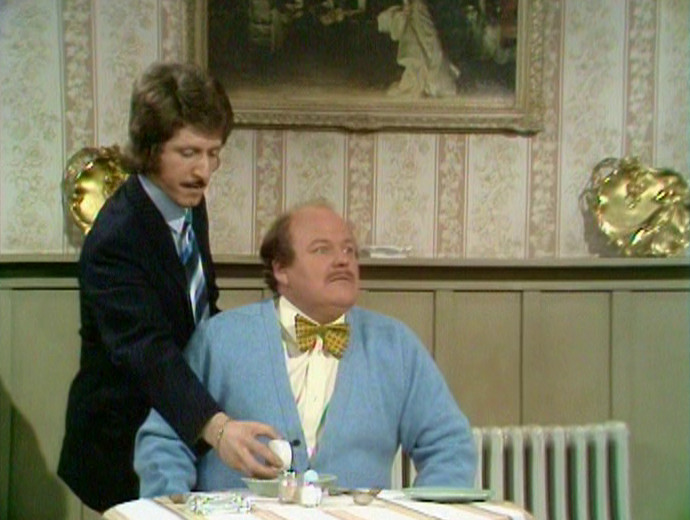
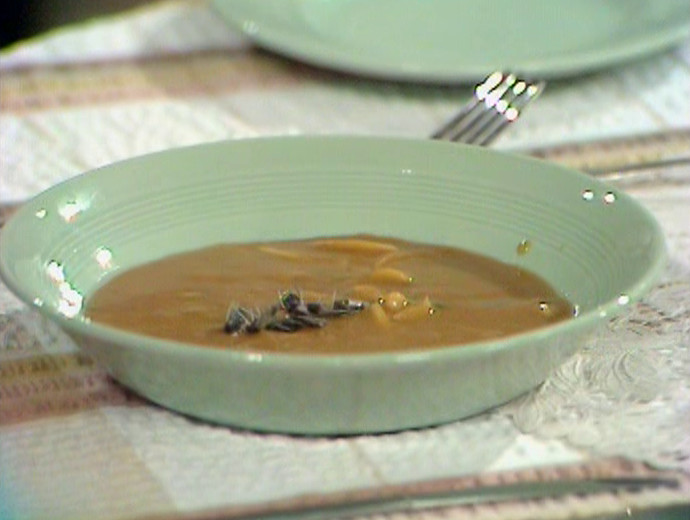
It’s difficult to pick out my favourite section of the above. I guess a good a moment as any is Collier is setting up the final humiliation, where as Mr. Davidson is trying to explain himself, he creeps up behind him and puts literal flies in Mr. Davidson’s soup. Not just one. A whole clump of them.
MR. DAVIDSON: Mr. Clifford?
MR. CLIFFORD: What?
MR. DAVIDSON: There are some flies in my soup.
OLD LADY #1: He doesn’t know when to stop, does he?
MR. CLIFFORD: I’ve heard that one before, Mr. Davidson.
“He doesn’t know when to stop, does he?” might be my favourite line of the whole episode.
It’s perhaps worth admitting that Collier and Stuart-Clark are in danger of going out of character in this scene. It’s not that they wouldn’t go out of their way to help Upton; they’ve done that numerous times before. But their help has usually been of a more… rumbustious nature, shall we say. The previous episode, Students at Heart, was all about how to get away with having dumped a consultant surgeon in the hospital pond. At the very least, No Ill Feeling! shows us a more thoughtful and manipulative side to both characters than the series usually allows us to see.
In the end, Cleese gets away with it, by writing the characters as exactly what they should be: clever people. They are doctors, after all. Clever people sometimes aren’t that welcome in your sitcoms; they can make a writer’s job harder, while stupid people can walk straight into any kind of nonsense the writer requires. Cleese works a little harder for his comedy, and I would argue that rather than Cleese writing Collier and Stuart-Clark out of character, the rest of the series just didn’t do quite enough to portray them as the intelligent people they clearly have to be. I’d bet money Cleese thought exactly the same.
Regardless of all the intricate character work throughout this episode, it has to be said that there is also a vague sense of an extended Python sketch here. And it’s interesting to see what Cleese says about the difference in the style of comedy between Python and Fawlty Towers:
“The Python audience was not that huge – it was rather smart, because it was very much a comedy of ideas, but Fawlty Towers was much more a comedy of emotion, and more people were able to plug into it.”
John Cleese, Fawlty Towers: The Complete Collection DVD interview
Obviously, that’s broad strokes – but it rings essentially true. No Ill Feeling! – made while TV Python was still in production – feels like a transitional period for Cleese. The scene we are dissecting here is a comedy of emotion and of ideas. And I find it ludicrously satisfying for exactly that reason. Flies being dumped in Mr. Davidson’s soup isn’t the kind of joke which would turn up in Fawlty Towers; it feels far more of a Python idea. Taking the tropes of comedy, and twisting them in on themselves.
Indeed, in one of the few really insightful pieces of writing on this episode, Billy Smart also cottons onto and expands on this. He is also one of the few people to really give Mr. Davidson his due as the centre of the show:
“He’s [Mr Clifford] actually second fiddle to guest star Roy Kinnear, who plays a self-styled funny man, Mr Davidson. With his jests and quips and insistence that everyone joins in, Davidson is a memorably awful personality. If this was an episode of Monty Python, he’d be played by Eric Idle in “Wink, wink, nudge, nudge” mode, and the importance that he places on being perceived as funny make him a kind of uncle to David Brent. The story shares features with a lot of Monty Python sketches, in particular the nightmare situation of being buttonholed by a monomaniac making presumptions about you (“No ill feeling! Eh, Doc?”) and a collective taking up a group insanity – the episode makes very good choric use of the other guests in the dining room, all laughing uproariously when Mr Davidson makes fun of Dr. Upton and then responding in appalled silence when Upton is compelled to tell a joke.”
Doctor At Large – No Ill Feeling! (30 May 1971),
The drunkenness of things being various
While I can certainly see a version of Mr. Davidson as being played by Eric Idle, I also fancy you can see a bit of Idle in Geoffrey Davies in this scene, with his slightly slimy travelling salesman look. All these elements add up together to make the sequence as much Python as Fawlty Towers.
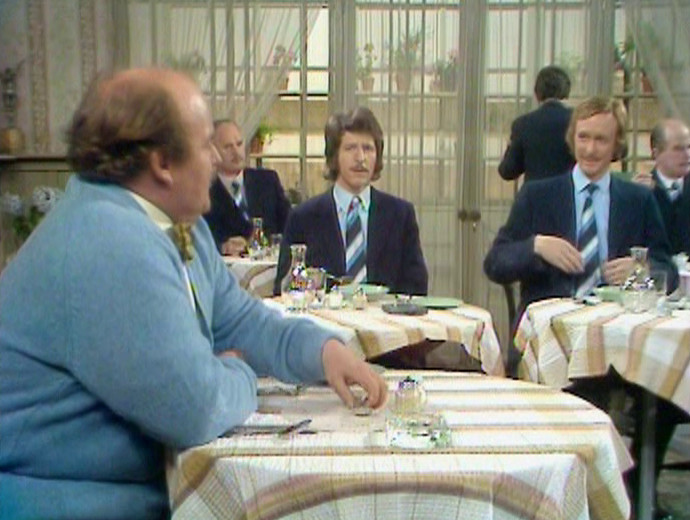
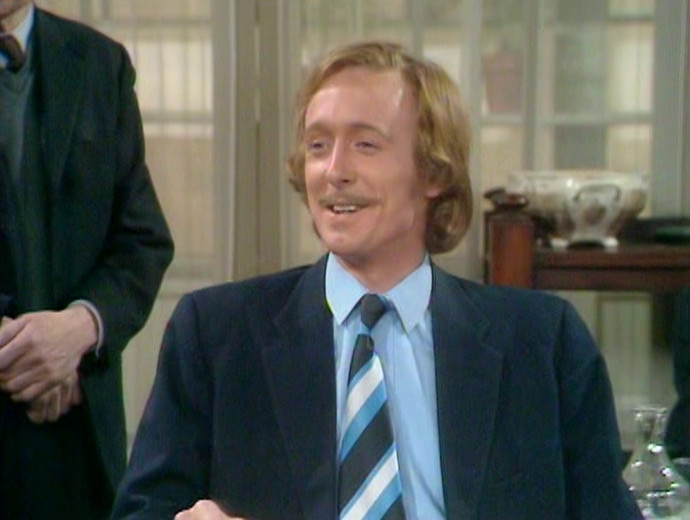
Anyway, back to our ritual humiliation, and the episode’s climax: Mr. Clifford pours a whole tureen of minestrone soup over Mr. Davidson’s head. While the audience react as you’d expect them to4 – doing unpleasant things to your actors always provides an extra frisson when you’re watching it in a studio for real – for me, it’s the least of Mr. Davidson’s humiliations. I much prefer Stuart-Clark slipping a whoopee cushion under him, and the ensuring loud fart. And as Upton shakes his hand with a broad grin – “No ill feeling!” – and the credits roll, we have a broken man. A joker whose weapons have been turned against him in the most vicious fashion imaginable.
It’s worth comparing this moment with its closest equivalent in Fawlty Towers. So let’s examine the fate of Mr. Hutchinson in The Hotel Inspectors – the character most like Mr. Davidson, at least superficially. And yes, Mr. Hutchinson gets a cream pie in the face, another in the crotch, and a suitcase full of the stuff. At first glance, that’s the same denouement for the pair of them. Cream pie, soup, it’s all the same.
But here’s the key thing with Mr. Hutchinson: right up until that moment, he’s been winning. He successfully manages to beat up Basil Fawlty behind the reception desk of his own hotel. And while Mr. Hutchinson’s justice is swift, essentially all he’s had is his jacket ruined. Basil sends him away with a flea in his ear, but that’s all it really is. You don’t get any kind of sense that Mr. Hutchinson has been destroyed by Basil. He merely gets his own back, just as in the playground, and that’s it.
In contrast: Mr. Davidson has his entire support network razed to the ground. And it’s done in a very precise way. Mr. Davidson is such a dull, predictable man, that every move he makes can be anticipated. So his endless cries of “Fire engine!” – something he is still going on about days later, because it’s the only thing he actually has over Upton – can be turned against him with ease. His joke about the pregnant woman can easily be subverted, because everyone already knows the punchline. And of course Davidson can be tricked into pretending he understands a nonsense joke. There was never any chance he would take the sensible option and simply point out it didn’t make sense. Too much of his precarious social capital is riding on it.
The cream may be applied to Mr. Hutchinson with aplomb; indeed, as a piece of physical comedy, it’s far funnier than the equivalent soup-pouring in Doctor at Large. But in terms of character work, I find No Ill Feeling! infinitely more interesting than The Hotel Inspectors.
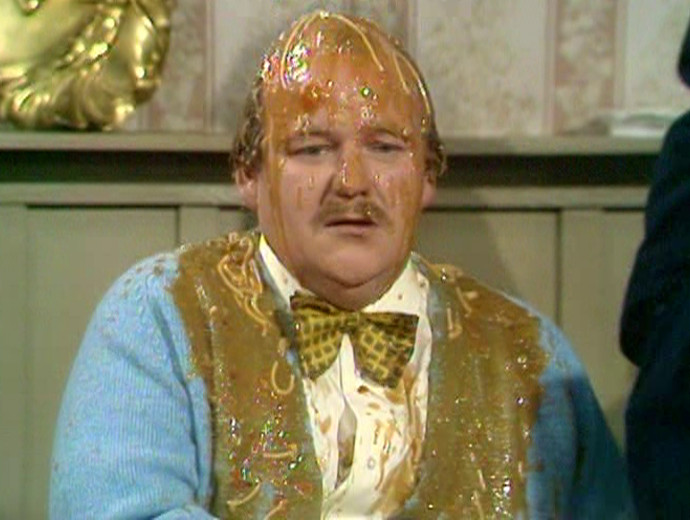
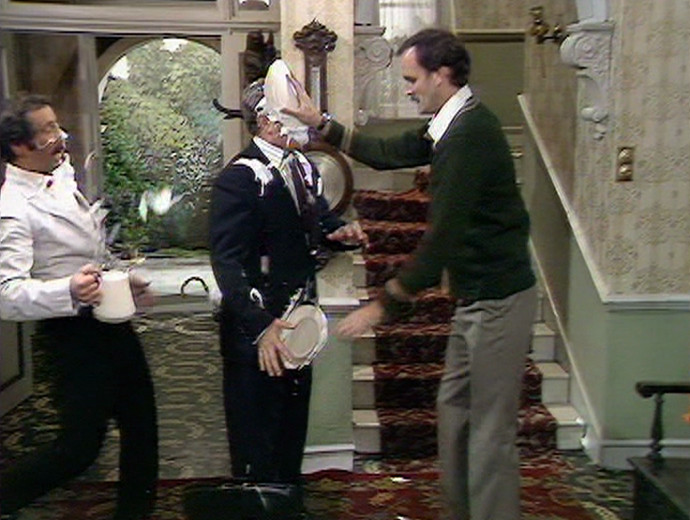
You may think: fine, so the fate of Mr. Davidson is worse than Mr. Hutchinson. But what about Basil? Doesn’t he suffer multiple humiliations of this kind? Aren’t episodes like Gourmet Night, which end with him grinning inanely in front of people he is desperately trying to impress, the equal of this scene in terms of taking apart the character? After all, in Part Two, I was arguing that Basil was at least as much a descendant of Mr. Davidson as he is of Mr. Clifford.
I would argue no: I don’t think there’s anything in Fawlty Towers which is quite this relentless, and ends in Basil’s complete and total dismantlement. But if you disagree with that, I still think there’s a difference here. With Basil, even if you see him at his lowest ebb this week, he pops up again larger than life next week, having learnt nothing. Indeed, take the end of The Hotel Inspectors: yes, he’s just done the worst possible thing in front of the “three gentlemen”. But there’s no ongoing ramifications for him. The hotel is exactly the same next week, just as it was exactly the same last week.
That’s just not true with Mr. Davidson. The last we see of him, the little world he’s so carefully built up for himself has been completely destroyed. We will never see Mr. Davidson again, but we know that his life at that hotel is ruined. Even in its darkest moments, I don’t think Fawlty Towers ever feels as deliberately cruel. But then, there’s nobody at Fawlty Towers who deserves that fate as much as Mr. Davidson. After all, for all his nonsense, we actually care what happens to Basil. But we are openly invited to enjoy Mr. Davidson’s breakdown.
And even Mr. Clifford is seen to smile in the closing moments, as Mr. Davidson’s humiliation is complete. “I hate you. And I hate your jokes.” Indeed, it’s interesting to ponder that Cleese gives Mr. Clifford his victory: the aforementioned pouring of the minestrone soup. Which is counter-intuitive for a proto-Basil Fawlty character: since when did Basil ever win? Think back to Communication Problems, where Cleese and Booth have Basil snatch defeat from the jaws of victory. Yet again, any kind of comparison of Mr. Clifford and Basil is as instructive when it comes to the differences as to the similarities.
All of which leaves us with an obvious question. People endlessly talk about Donald Sinclair of the Gleneagles being the inspiration for Mr. Clifford and Basil Fawlty, but as I have demonstrated, No Ill Feeling! is far more interested in Mr. Davidson. And John Cleese is clearly the angriest man in the world about him. You surely don’t write this episode without some deep, personal experience of somebody like this.
So: which particular real-life acquaintance of John Cleese was Mr. Davidson based on? I do hope Cleese thoroughly enjoyed his revenge.
* * *
There lies the tale of one of the most unpleasant characters in the world, and his brutal downfall. But No Ill Feeling! is endlessly interesting. Just when you think you’ve thoroughly examined everything the episode has to offer, something else fascinating pops up.
Next time, in our final part, we take a look at how John Cleese uses Mr. Davidson to take a jab at Doctor at Large itself.
With continued thanks to Tanya Jones for her expert suggestions and feedback.
Emphasis mine. ↩
“Every time he diagnoses pernicious anemia, his trousers fall off.” ↩
Oddly enough, that episode was by Graeme Garden and Bill Oddie, rather than John Cleese. It also features the most alarmingly wobbly credits this side of Some Mothers Do ‘Ave ‘Em. ↩
On the DVD version of No Ill Feeling!, over the LWT endboard after the sound has faded away, you briefly hear an extra snatch of audience reaction… still laughing at Roy Kinnear in a mess. ↩
